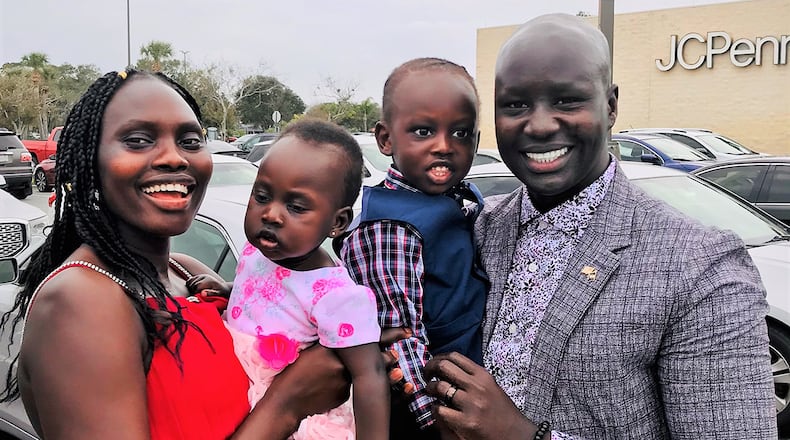Pour’s childhood was filled with hunger, violence and fear as he survived the 1983-2005 Sudanese Civil War. When he was 5, his village was attacked, and he was forced to flee with family members to Ethiopia. They often had nothing to eat for months – somehow surviving on mud and grass. He was separated from his mother and watched as many in his community were murdered.
Later, in a refugee camp, he was reunited with his mother but was then forced back to South Sudan when war broke out in Ethiopia. Only about half of the 500 people in his entourage survived the long, difficult return, due to gunfire, disease and wild animals.
“But once again,” said Pour. “I made it. I survived.”
Back in his war-torn village, he and a cousin were lucky enough to accompany the crew of an international aid plane back to yet another refugee camp in Kenya. Though still very poor, for the next five years he had food and was even able to attend school.
He then had the miraculous opportunity to immigrate to the United States where he became one of the thousands of young Sudanese known as the “lost boys.” Pour spoke very little English and was far behind in school, but he worked hard to catch up on his reading and arithmetic.
He finished high school and even received a college scholarship for soccer, but he knew even then what he wanted to do, and that was to help others who might feel “lost” in any aspect of life. He joined the United States Air Force and began a career where helping others is a priority.
“I saw the Air Force as a community of mentors,” he said. “They welcome everyone, and there is always someone to get you back on track if you feel like giving up.”
In his current position, Pour ensures that the chaplain offices across AFMC are equipped to meet their mission. A lot of his time is spent working directly with Airmen experiencing life challenges. Even if all he can do is listen, he knows that he is helping people to move through the experience, to persevere and come out on top.
“I have faced many roadblocks in my life, but I’ve been reminded that if you are determined you can accomplish anything, and now it’s my turn to remind others,” said Pour.
Though his job stateside is important, Pour found his calling during the five deployments he has served in his 15-year career. Deployed Airmen are often especially in need of a sounding board, and he was there. His assignment with the Combined Joint Task Force to the Horn of Africa was a dream come true. His language expertise and knowledge of the local culture were instrumental to the success of the mission, and he hopes to return.
Until he can return to Africa though, Pour volunteers with the local Sudanese community in Centerville, Ohio, and the refugee community in Tennessee where he lived during part of his adolescence. He mentors young men and is proud to say that several of his mentees have joined the Air Force as well.
Pour stays busy with his family – two children and another baby on the way. He and his wife, also a Sudanese native, strive to teach their children to appreciate what they have and to give back to others.
He has also continued his college studies over the years and is pursuing a master’s degree in Aviation Cybersecurity Management with Embry Riddle University. He expects to graduate in December. From there, he is unsure what his future career path may entail, but he is certain that leaving the Air Force is not an option.
“I love my job and my life here in the U.S.,” Pour said. “It allows me to interact with people who are experiencing difficulties and actually be in a position to do something to help.”
Reflecting on Black History Month, Pour is especially grateful to the Black Americans who paved the way for him and for others to serve in the military.
“My goal is simple: to make a difference,” he said. “I’m here to let others know there is hope and opportunity.”
About the Author
